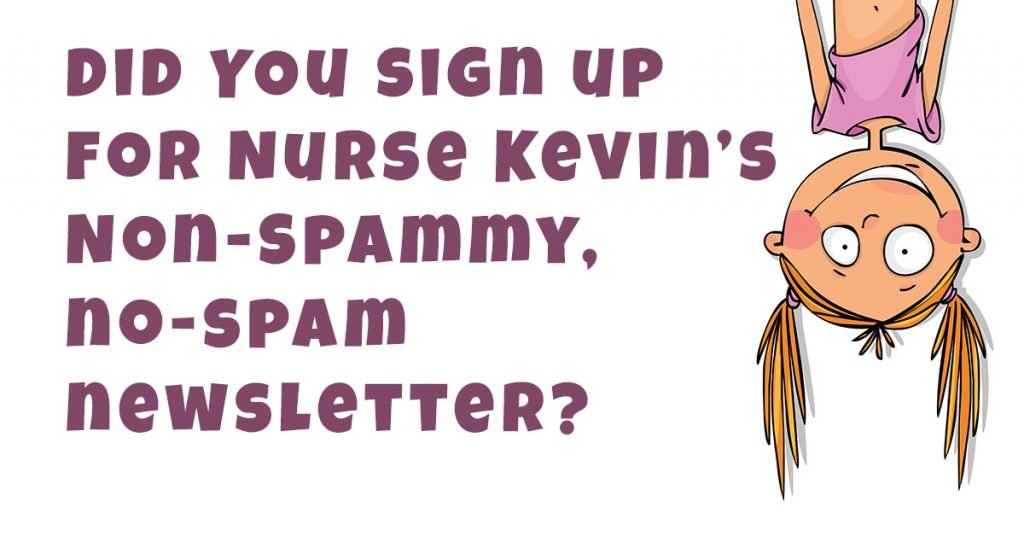
How to Eat an Elephant?
One bite at a time, right? How do you suffer from type 1 diabetes? One cell at a time. Unmanaged type 1 diabetes is like taking a penny nail and small tack hammer to a brick wall; it may take some time, but eventually, the wall will fall.

Hospice nurses get a lot of gas. No, not that that kinda gas. We get a lot of gas for our cars. And this one day, while standing at the gas pump in a small satellite town near Boise, Idaho, where I had been a hospice nurse for nearly a decade, a lady comes up to me and gives me the biggest, longest hug I had ever received from a stranger. For the life of me, I could not remember who this lady was, but she sure ‘nuf knew me. And she thanked me over and over for taking care of her mother “in her last days.”
This hugging lady kept on thanking me for all the things I had done for her mother. On and on she went. Although I didn’t remember this daughter at first, the memory of her mother quickly began to piece together for me. Her mother had suffered from lung cancer that was secondary to…yep…just what you were thinking.
Maybe it wasn’t “appropriate” for me to ask hospice patients about life’s regrets, but I would. And you know what? None of them ever said, “None your business.” I was always puzzled by the patients who were on hospice services in their 60s, 50s, and even their 40s (some younger…MUCH younger). Some had conditions that were real head-scratchers, for sure. You’d wonder, “How does a healthy, beautiful lady of 39 develop terminal colorectal cancer?” Others…well…you were able to put two-and-two together and understood the reason. There’d be no loss of sympathy for my patients with “lifestyle-induced” terminal conditions…NO! Not at all, and please don’t read that into my message. My compassion runs deep; life is freaking hard sometimes and harder for some than others.
Regrets. We all have them. But, when some of these hospice patients had made lifestyle choices that they knew would shorten their lives, it was still so common for them to ask, “Why didn’t anyone tell me?” Deep down, they knew why, but still searched for a rhyme-or-reason why no one cared enough to tell them…that they could remember, anyway.
As this daughter at the gas station reminisced about her mother, I remember that her mother was one of whom I had asked the question, “What do you regret in your life?” Her answer came after a long sigh…“Smoking so much.”
But this is a school nurse website! Why are we talking about hospice patients??? We school nurses are at the threshold of these little people’s lives. And, we school nurses have a slight bit of influence on these children. We may very well be the one who influences a child’s decision that would have otherwise been made and lead the child in a direction with negative outcomes…outcomes that may make themselves known just 2-3 decades after they leave your care, outcomes that leave them sharing their regrets to a hospice nurse in their 40s or 50s. But, instead, we school nurses teach and coach and even “fuss” a little (some more than others) in order to thwart the world’s influence on the child and cause a different choice to be made by the child that will enhance and lengthen their lives.
But not all chronic conditions are secondary to lifestyle choices. Type 1 diabetes is a condition that just is-what-it-is. Am I being flippant? NO! Not at all. I’m just being honest; a type 1 diabetes diagnosis will change the course of the person’s life in 1000+ ways. And, on average, they have just been robbed of about 12 years of life.
We all start with limitations just for being biological beings with physical limitations. If you smoke, your pre-existing “limit” of lung tissue to withstand the toxic gasses they are bathed in will end up making itself known in one form or fashion. Your heart’s pre-existing “limit” to pump blood throughout a 350-pound body will make itself known sooner or later. And, (diabetes or no diabetes) a body’s pre-existing “limit” of the bombardment of the effects of hyperglycemia will make itself known and usually sooner than later. It’s not a probability; it’s an expectation.
It’s not the Condition; it’s the Attitude Toward the Condition
It’s not the type 1 diabetes that I want to talk about today; it’s the choices and the paradigm that I’d like to talk about. If being a school nurse was “just a job” for me; life would be perfect. After all, ignorance is bliss, right? Sure it is! Until that of which we were ignorant makes itself known, and then the “why” questions start, “Why didn’t anyone tell me this would happen?”
A hypothetical child walks in the health office with a hypothetical diagnosis of DM1 with a hypothetical blood glucose level of 360mg/dL. Knowing that our schools all hypothetically offer balanced breakfasts, this hypothetical diabetic child just happens to be preparing to eat her school-provided breakfast tortilla, chocolate milk, and apple juice.
School nurse: “360? Wow, that’s a bit high for this early in the morning. Did you eat anything this morning before you left home?”
Child, looking away slightly: “No.”
School nurse: “What was your sugar last night?”
Child: “Didn’t take it.”
Can you think of a word that is less therapeutic than, “Why?” Nonetheless, we nurses still are drawn to ask.
School Nurse: “Why?”
Child: *Shoulder shrug*
School Nurse: “Did you take your insulin last night?”
Child: “No.”
It’s at this point where a school nurse…any nurse…looks back at all the teaching, all the encouraging, all the fussing, all the overlooking, all the calls home, all the elevated blood glucose levels in a child that is able to tolerate 7, 12, and 19 units of regular insulin at a time. It’s at this point where you think to yourself, “This child will not see 40 years unless something happens with this child’s and his parent’s perspective and attitude.”
Kids know a lot…but they sure have a long way to go before they know everything. (We all do.) The problem is: some (meaning “most all”) feel that they know everything at 10 years old. When the fussing, encouraging, overlooking, and the calls home do not influence the situation, maybe asking a question that “questions” their understanding will be an eye-opener for the child.
School nurse: “What has more sugar: Coke or apple Juice?”
Child: “Coke, for sure!”
Watch their eyes when you tell them that apple juice has more sugar. In this hypothetical scenario, the child’s appearance of surprise ended quickly. This was followed with, “So what? I don’t care!”
Let’s stop here with this little interaction. This is a lose-lose situation. The nurse will lose the ability to influence. The refusing-to-be-influenced child will lose as well (and you know what’s on the line for the child to lose). What dreadful things is this child going to have to experience in her life that will cause her “I don’t care” to change into “I wish I wouldn’t have.”? We school nurses know; we’ve seen the end result.
Life always charges interest on the pleasures we enjoy today, and sometimes those interest payments, when all added up in the end, are more than most folks realized they’d have to “pay.” — Nurse Kevin
Interest Payments on Unmanaged Type 1 Diabetes
First of all, life expectancy is about 79 years old in the USA. For men with type 1 diabetes, that is reduced by 11 years to 68; for women, that is reduced to 66 years old. Folks, that ain’t even enough time to collect social security.
The problem about life expectancy is that children don’t have enough life experiences to know what “life expectancy” means. We adults do…especially if you are like me and in the late part of your fourth decade.
Question: Does the diabetes cause diabetics to live shorter lives, or does the effects of diabetes cause the reduced lifespan?
Think about that for a moment. If the effects of diabetes cause the problems, could the diabetic gain a few more years past his or her life expectancy if they manage their diabetes well? Heck, we ALL could say that, right? Sure we could!! I’ve taken care of 106-year-old men for whom I had to dig and search the medical records to “qualify” them for hospice care…and then…less than 6 months later, I had to prove during a survey how this 106-year-old man died of more than just plain “old man-ism.” He got 27 more years than “expected.” Couldn’t the person with type 1 diabetes?

Life Expectancy
Life expectancy is really life “assumption” or life “calculation.” There’s no guarantee that at 79 years old that folks will pass on just because the life expectancy is 79 years. Many of us live under the paradigm that we can influence that 79-year “expiration date” just a bit. So, we “manage” ourselves by watching what we eat and drink. We exercise. We take vitamins. We “manage” ourselves.
That expiration date on the milk carton may not be quite accurate if you leave the jug out overnight. An “unmanaged,” left-out-overnight jug of milk will “expire” long before the printed expiration date. Why? Because it wasn’t “managed” well. And, a jug of milk with a printed expiration date that is “managed” well by keeping it in the cool fridge may be fine-and-dandy days and days after the expiration date. And, if you are like me, you’ve consumed expired milk before and walked away happy and well.
Motivation
Why do we nurses spend so much time trying to motivate people to take care of themselves? Do you want to know why? Because doughnuts taste good, and celery doesn’t. For you, I-love-celery-ers: you know exactly what I mean!
There are so many methods of motivation. All you have to do is take a look at Maslow’s Hierarchy of Needs and find out which of these needs are being self-threatened and point that out to the child, parent, or whoever. No, you are not threatening them and suggesting that you will take away any of their basic human needs. No siree, Bob! “Life” does the “threatening” and the “taking.”
As a school nurse or a “regular” nurse, way back when you were in nursing school you were told you’d be a teacher…a health educator. It’s one of the main principles of nursing: To teach. To teach is to share the conclusion of a problem and the pathway to getting there. Remember your math teacher saying, “Show your work?” You, the teacher, know the conclusion of the problem…the one being taught does not.
How do you motivate a child who had type 1 diabetes and is so resentful of the diagnosis that they are almost bounded and determined to ignore it? How do you motivate that child whose mother feels that she wants him to be an “normal boy?” Telling the child and his mother that there’s a full future of diabetic retinopathy, kidney disease, cardiovascular disease, hypertension, organ damage, and nerve damage resulting in painful neuropathy is your responsibility. But, it’s still hard when you, too, want the child to be a “normal child.” How do you tell a child and his parents that, unless they manage the diabetes, that the child will…not may…but WILL…develop a painfulness in the feet and hands that feels both numb yet is prickling and tingling at the same time? It will be a “numb” pain that is so hard to describe. The sharp, jabbing, throbbing, freezing pain that is also a burning and numbing pain. How is that possible? The pain is not the only issue. What about losing some of the control to the legs due to the nerve damage, followed by a lack of coordination and falling down…maybe even paralysis?
You do know that we’ve only touched a small part of the issues that are secondary to diabetes.
A “normal child” — But who is normal, and by what standard is “normal” defined?
“Nurse Kevin!” A co-educator shouts from the hall in an attempt to be heard by both myself and by others nearby, “What are you eating for breakfast?!?! Is that iceberg lettuce??”
Most mornings you can find Nurse Kevin, early in the office (but not too early), eating a bowl of about 5 cups of chopped iceberg lettuce and 4 ounces of chicken with about 2-3 tablespoons of Greek yogurt ranch dressing…for breakfast.
My co-educator shouts, “Nurse Kevin! That’s not normal!!”
But a “normal” breakfast to most people (school districts included), is either a couple of Pop Tarts and chocolate milk, or sausage pizza bites and juice, or a super-sized #3 on the McDonald’s thing-a-ma-jig drive-through board.
Again, what is “normal?” For me, that iceberg lettuce is perfectly normal. Plus, no one ever in the history of the world has ever said, “Iceberg lettuce made me fat.” Just sayin’!
Would I like to eat a doughnut (or six), a huge creamy, sweet coffee drink for breakfast (or anytime)? Sure I would!! But, I have a predisposition of being able to gain weight and become a fat boy seemingly over night. So, I deny myself. Not all the time. I enjoy a treat now and again. But I moderate because of my body’s limitations. So, poor me! Right? WRONG. And neither is it wrong to motivate the child to deny herself the foods that “all the other kids are eating.”

Truth be known: If they keep eating like that (like the diabetic child believes they are eating and enjoying and she is missing out on), they will end up with diabetes, obesity, heart disease, and the like soon enough…but that is a whole ‘nuther story for this old-time hospice nurse to tell you about.
So, I am still stumped! Stumped like no other stump in the world. On one hand, I prefer the lack of “drama” in my life. And, there’ll be a mad mamma calling you to express her frustration that you made her diabetic child cry and that you’re being a bully and “beating her up” (emotionally). That’s a dog-on hassle and a half!! Wouldn’t it be easier to just say, “Okay child, here’s your 12.5u of regular insulin to cover the 360mg/dL and the 50-something grams of carbs in this one meal. See ya! Have a good day.” Maybe today would be a “good day.” But what about the 10-years-from-now “tomorrow?”
And then I see all the faces of the diabetic patients that I have woken up early to get an early breakfast and carry their bagged lunch to their appointments either on a Monday / Wednesday / Friday schedule or a Tuesday / Thursday / Saturday schedule because of complications from their diabetes (you nurses know what “appointments” I am talking about). I see the faces of the ones that cannot sleep at night and who “can’t have another pain pill until…” I see the ones who used to love to read but can’t see anymore. I see the ones who, along with the dozen or more other medications they have to take, are now taking anti-depressants and anti-anxiety medications because life just feels so freaking miserable. After all, not only do they have a lower-than-“normal” life expectancy, the last 2-6 years of their lives were…well…you can imagine.
Just doing the best I can with what I got, right?
So, instead of having a “good day,” I search for the motivator that the child needs to take her diabetes by the horns (or something else!), put on that emotional “blue ribbon,” and manage that diabetes. Because, wouldn’t it be better to have a good life instead of a good day?
What causes a shorter life expectancy in diabetics? (https://www.diabetes.co.uk/diabetes-life-expectancy.html)
Wouldn’t it be better to have a GOOD LIFE instead of a good day?

WELCOME MAY 2019!!
Will Nurse Kevin post during the summer?? Gardening? Photography-ing? Cooking? What about nursing? Sign up for Nurse Kevin’s not-spammy, easy-sneezy newsletter and find out.
Your information is kept private! Here’s my Privacy Statement.




Amen, amen, amen!!! Couldn’t have said it any better. When you find a magically solution please pass it along. Especially when dealing with our school age diabetics who really are at the hands of their parents it is heartbreaking when not taken seriously.
*magical*
It’s so true. A parent’s “future” is 10-years from now; a child’s “future” is 10-minutes from now. I’ve had those mothers get mad at me and complain to my admin because I my 14th teaching sessions resulted in my being more “pointed” and “explicit” with the end result of their illness. But, just because mamma’s mad does not make her right. And, thank goodness my admin doesn’t live under the idea that “the customer is always right.”
Magic Solution? I think it’s a matter of being a good-cop / bad-cop. Or, persistence…maybe…